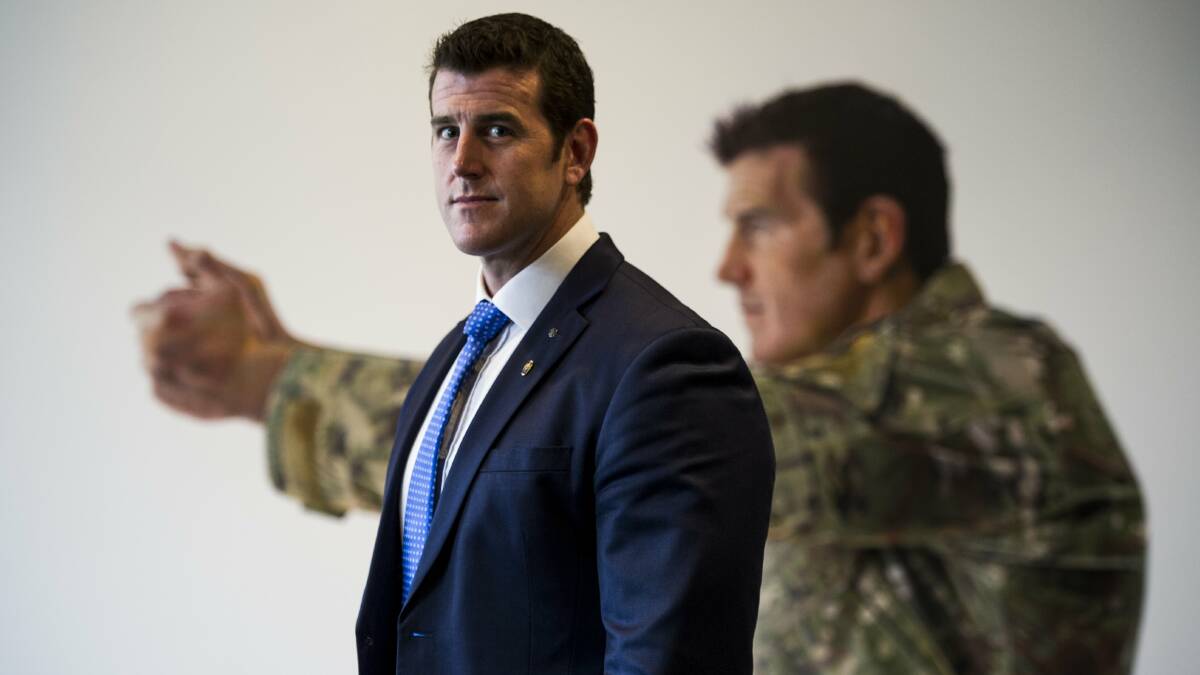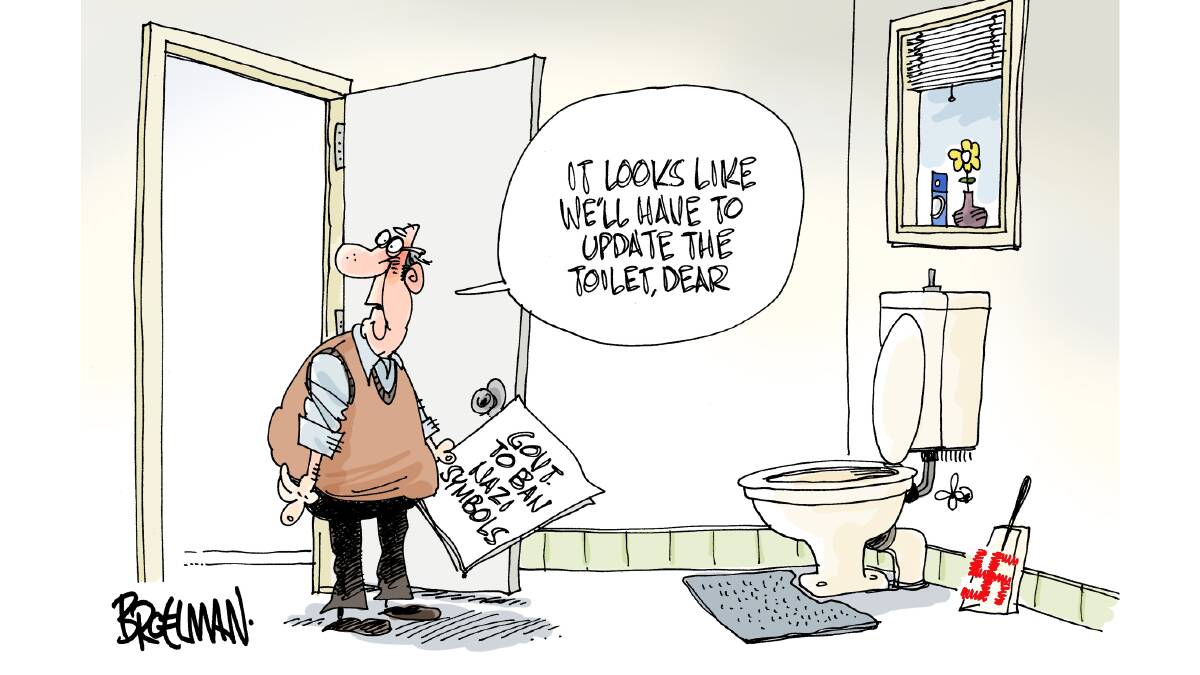This is a sample of The Echidna newsletter sent out each weekday morning. To sign up for FREE, go to theechidna.com.au
Subscribe now for unlimited access.
$0/
(min cost $0)
or signup to continue reading

You couldn't make him up. People wouldn't believe you. Not with that granite jaw, that immaculately swept hair, that comic book superhero physique and that massive chest boasting more medals than the display cabinet at your local RSL.
No wonder so many politicians and powerful businessmen couldn't get enough of Ben Roberts-Smith. Wasn't so long ago they were patiently forming conga lines at every picture opportunity, ingratiating themselves with Australia's most decorated soldier like kids at a theme park fawning over Buzz Lightyear.
Or, as it now turns out, like flies swarming a rotting carcass.
Well, Ben Roberts-Smith - even the name sounds like the contrivance of a Hollywood casting agent - will no longer have to suffer all those sycophants and combat fan boys with their sad little man crushes.
Last week's devastating judgement by Federal Court Justice Anthony Besanko, which labelled the chiselled All-Australian warrior a multiple murderer and liar, destroyed Roberts-Smith's carefully crafted reputation and has, undoubtedly, strained his relationship with his greatest supporter and financial backer, the billionaire Kerry Stokes.
But it has also dealt a long overdue setback to the baffling and long-running khaki cult that has dominated Australian culture for decades. Few Western nations memorialise war and conflict more than us, fewer spend more money doing so and not one can surpass our unique talent for transforming Anzac Day football matches into quasi-religious spectacles.
First, a necessary disclaimer before that horde of armchair patriots start howling treason. No one is suggesting we should ever forget the sacrifices made by those who have fought for their country. But don't we owe them more than platitudes, cliches and unquestioning fealty? Didn't they fight to defend our right to question?

Australia may not be a nation of cathedrals but we excel at memorials. Country towns are lined with pine trees to mark the dead. Suburbs are full of RSL clubs exhibiting the uniforms and dog tags of combatants. And every city has a grand edifice, a war monument devoted to quiet reflection and gratitude.
Yet that was never enough because the past decade has witnessed the unprecedented spending of taxpayer money on questionable war commemorations.
It began in 2014 with the outlay of more than half a billion dollars to mark the centenary of the start of World War I. That amount represented almost $9000 for every digger killed during that conflict - five times the amount spent by the UK and 17 times higher than New Zealand.
More than $100 million was then devoted to the construction of the Sir John Monash Centre at Villers-Bretonneux in France, an "interpretive, multi-media centre" highlighting Australia's contribution to the war on the Western Front. Fields already filled with endless white crosses and others still scattered with bleached bones were, apparently, not testament enough to the sacrifices of thousands.
But nothing speaks more to our slavish devotion to this khaki cult than the decision to award more than $500 million of taxpayer money for the expansion of the Australian War Memorial in Canberra.
It's an extraordinary amount for a nation that, for years, shamefully ignored so many veterans with mental health issues who, ground down by an uncaring bureaucracy, chose to take their own lives.
It's money spent on an enormous museum that willingly accepts hundreds of thousands of dollars in donations from military contractors that design and sell the very weapons that kill our soldiers.
It's a figure just as confounding given claims that our defence forces are at their lowest state of combat readiness in decades, hampered by low morale, malfunctioning equipment and falling defence budgets.
Even more unpalatable is that it is happening at a time when Australia is reluctantly beginning to concede that bad things - not just glory - have been committed by the men we train and send off to war.
The defamation trial launched by Ben Roberts-Smith, who is now widely known by the acronym BRS, is not the first time an Australian judge has exposed war crimes and cultural problems within our special forces.
A report three years ago by NSW Supreme Court judge Paul Brereton uncovered evidence of the murders of 39 civilians or prisoners in Afghanistan by our special forces, unethical behaviour in senior defence ranks, a "warrior hero" culture and the exclusion of soldiers from the usual rules of combat.
Turns out the public image of BRS was BS. Just like the khaki cult that created and revered him.
Time to build a better and more realistic culture for the future. What a grand and lasting monument that would make.
HAVE YOUR SAY: Should Australia spend less on commemorating war? Why do you think we have devoted so much money to memorials? Do you believe the money could be better spent elsewhere? Email us: echidna@theechidna.com.au
SHARE THE LOVE: If you enjoy The Echidna, forward it to a friend so they can sign up, too.
IN CASE YOU MISSED IT:
- Anthony Albanese has declared he has "absolute confidence" in senior minister Katy Gallagher in the wake of claims that Brittany Higgins and partner David Sharaz had contact with senior Labor politicians before her rape claim was made public.
- COVID-19 can fuse brain cells and may explain some of the more baffling symptoms of brain fog, headaches, loss of taste and smell and other long-term neurological symptoms. Researchers, studying the SARS-CoV-2 virus that causes COVID-19, found the virus can infect the brain and cause brain cells to fuse together and either malfunction or stop working completely.
- Anyone planning to celebrate the long weekend in NSW with a backyard fireworks display is being warned they risk hefty fines and even jail time. While "cracker night'' used to be an annual family festival in backyards across the country, the last one celebrated in NSW was in 1986, before it was banned for safety reasons.
THEY SAID IT: "In war, there are no unwounded soldiers." - Jose Narosky
YOU SAID IT: RBA governor Phil Lowe's advice to spend less and work longer was tone deaf and infuriating.
Mark says: "Another way to reduce the money supply is to increase taxes. This can be targeted at the wealthy half of the population, leaving battlers unaffected. Can we have an inflation levy? Battlers would benefit by stabilising prices. The wealthy would curtail a few luxuries. Is that too simple or would the wealthy cry out?"
"I won't defend Phil Lowe's less than empathetic communication skills," says Phil. "He's eminently qualified for his job, but really does need to hire a spokesperson. I will point you at the inflation rate in Argentina: it's gone from 60 per cent in May 2002 to 110 per cent in April 2023. It's what happens when inflation is not controlled. Awful pain. The Reserve Bank is tasked by the politicians in charge to contain inflation. They have one tool to do it with - interest rates. If that tool is causing pain, blame the politicians who won't restrain fiscal policy as long as they can deflect the blame to a more than convenient scapegoat. I do agree that we need a better method to control inflation."
Richard says: "The RBA is not the problem. Our real problem is a federal government that dare not do anything to solve the problem because the opposition will crucify them. The most obvious example is stage three tax cuts, everyone knows we as a nation can't afford them but instead of a bipartisan approach Dutton will scream 'broken promise' if the government changes direction. There are so many ways the government could cool the economy with a more evenly targeted approach. A temporary tax levy or a temporary increase in the compulsory super contribution are just two examples that would spread the effect more broadly. Neither will happen because the opposition sees their role as being oppositional rather than trying to get the best outcome for the society at large."
"I think Mr Lowe insults many of us who are doing it tough," says Loong Wong. "He's giving us the finger when many of us are already working too many hours to make ends meet, rely on JobSeeker and pensions and the cost of living continues to spiral. This is also attributable to the Labor government for not doing enough to help and assist those of us caught with high prices, high energy bills and seeing our lives starved. What else can we cut?"


